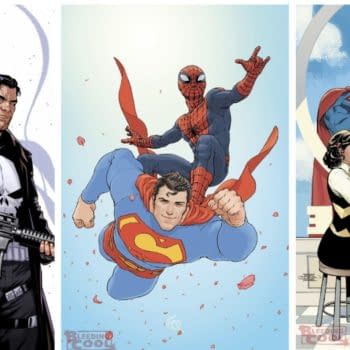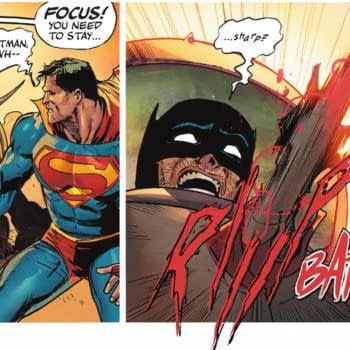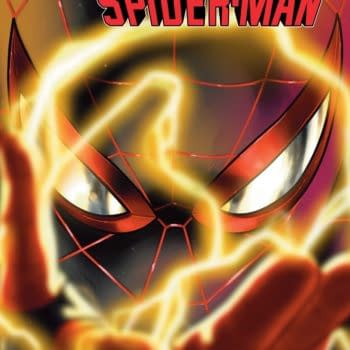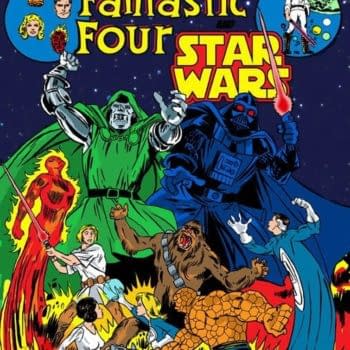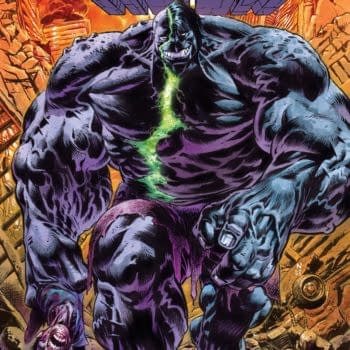Posted in: Comics, Recent Updates | Tagged: British Library, Comics, comics unmasked, entertainment, grant morrison, sarah zaiden, warren ellis, will brooker
When Grant Morrison And Warren Ellis Sat Down To Chat About Superheroes At The British Library
The British Library pulled a neat trick. As part of a series of events alongside the Comics Unmasked: Art And Anarchy In The UK exhibition, they had comics scholars Will Brooker and Sarah Zaidan to deliver essays about the history of superheroes which, while interesting, might not have brought a crowd out on a Monday night in London.
But that was okay, because they ended it by getting Grant Morrison and Warren Ellis on stage afterwards to discuss superheroes. And, as a result, packed the place out with tickets selling out in seconds of going on sale.
Ooh, look this article did the same trick with its headline.
Sarah Zaidan and Will Brooker gave a presentation each, looking at the history of superhero comic books through the decades,through their own individual filters.
Zaidan looked specifically at the portrayal of women in super hero comic books, decade by decade, pointing out the excesses but also commending the exceptions, including the female-created Miss Fury from the forties, the introduction of Batwoman and Batgirl as a response to the television show trying to widen their audience. Most importantly, how progression in superhero comics always lagged behind with women and how the real progression happened outside of the Bg Two, if somehow disguised, with the likes of Femforce, Gen-13, Go-Girl and the recent revival of Glory. Only now do the likes of Ms Marvel, Batwoman and Captain Marvel show that things are beginning to change elsewhere. But she did conclude that a greater diversity of sales over the last few years, showing statistics that indicate readers are moving away from the Big Two indicate a desire for diversity that the mainstream superheroes might not supply.
Brooker used a similar technique, but pointing out peculiarities along the way, from Superman's obsession with fighting slum landlords to Batman's only engagement in the Second World War in appeals to buy war bonds on the cover, which would be picked up later, as well as enjoying the innuendo of gay Batman in the fifties and Dr Frederic Wertham's believe that the Blue Beetle comic was Kafkaesque, somehow getting it mixed up with Metamorphosis. The gayness of superheroes was expressed through their fear of marriage, and how romance could be a greater danger than a supervillain. Running through seriousness and light, Brooker pointed to the last decade being what he called "prismatic", showing off different versions of characters simultaneously. And also pointed out that even in the more criticised moments of comic book excesses, there are always prominent examples of superhero comics going in the other direction, from The Authority to The Invisibles. Well chosen examples there.
Because alone, they may not have brought a packed house. But combined with Warren Ellis and Grant Morrison taking to the stage to join them in discussion, with chair Sam Leith, the tickets sold out in a picosecond, and everyone got an education.
And, just as it was with the Alan Moore/Brian Eno interview on Radio 4, when two British men of a certain age and a certain culture get together on a stage, they end up doing Peter Cooke and Dudley Moore routines.
Morrison talked directly about the history of superheroes impacting on his desire to write them, and how the New 52 did away with aspects of that for him, the characters were now too new.
Warren Ellis upped the level, naming superheroes as commedia dell'arte, stock characters in stock situations, but improvised within those restrictions. I suppose they also had masks as well. But it's also what Grant called playing twelve bar blues, working within a set structure.
Ellis also talked about how superhero comics had become rescue fiction, in which we are not in fear for the superheroes but for the people they are trying to rescue.
As for the portrayal of women in superhero comic books. In terms of the physical look, Warren Ellis said that it was simply down to a lack of imagination. That the books were by "young men trapped indoors who have realised they've been paid to draw boobs." Brooker pointed out that the 4F superhero comics were by men who weren't going to war.
Warren Ellis picked up on that, either teenagers or those deemed 4F, too weak and/or sickly to fight, and how comic books became the creators' own way, their way to contribute, a power fantasy for children coming from a power fantasy of adults. Morrison pointed out that superheroes were nude studies, "boys painting sexy girl and sexy boys."
Grant did point to the first superheroine though, Ma Hunkel, a middle aged mother with a saucepan on her head and rather strong protecting her family and neighbourhood, who first appeared in 1939 in All-American Comics #3. It's a shame that depiction never caught on…
Grant Morrison also expressed his belief that Superman was a far ore realistic superhero than Batman – Batman couldn't make it through the week without his knees getting fucked, while an alien coming from another planet powered by solar rays , Grant could see that as much likelier to happen.
Warren talked about Batman in Grant Morrison's JLA, as playing the role of the trickster god, the least powerful amongst the gods, but having the edge through his very nature.
And Grant and Warren both delighted in Jim Starlin turning subtext into text, having Warlock fight literal embodiments of suicide or self doubt, driving the character mad in the process.
On the challenge to comics from superhero movies, Warren said "They can do sound and movement but it cant more more than two hours long. Ultimately people show up for the stories as well as the scale" but wondered how the Marvel Netflix series, four series with 13 episodes and bookends will bring novelistic storytelling to superheroes on the screen.
Warren also considered the point that "The one really interesting thing about nineties superhero comics… they did completely accidentally they removed the secret identity . The character was the superhero name, none of them had secret identities, none of them had human lives…" which also tied into a later comment about how superheroes are work that have often gone unexamined, and by that he meant unexamined by the actual creators. Presenting it without even thinking it through… "they weren't bringing political consciousness of awareness to this work, it was just the way things are".
Something that couldn't be levelled at anyone on the stage tonight.
Grant talked about how he saw superheroes as a potential future for humanity, they point the way to super compassion, super compassion, super connectivity, more than super speed and super flight. But he also talked about reading up on nihilism of late and wants to "embrace the zombie ethos that's complete overridden this culture – I'm getting bored doing the single shining light,"
I tweeted a couple of points about to this, to find Rob Liefeld replying saying,
@richjohnston expand/ explain this statement… Please… My full attention…
— robertliefeld (@robertliefeld) June 16, 2014
Which made the evening an even more surreal experience.

You can hear a rather dulled version of the audio below… you may need to turn those speakers up, and watch out for any crackles, but I reckon it's worth it.
[youtube]https://www.youtube.com/watch?v=fjbzklRn8H0[/youtube]
And why not check out Brooker and Zaidan's Kickstarter right here… perfectly timed.
Photos by Dean Simons and Kristan Morrison.












